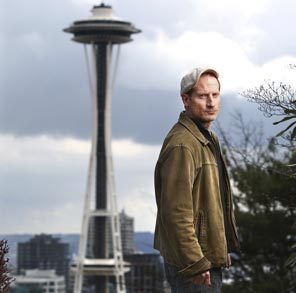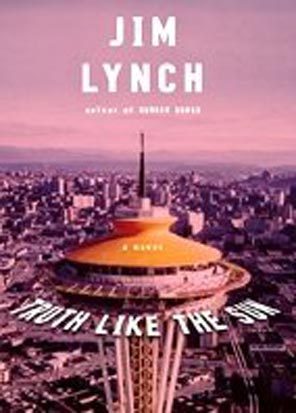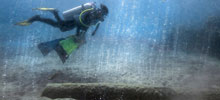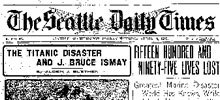Originally published April 9, 2012 at 5:00 AM | Page modified April 9, 2012 at 1:58 PM
Lit Life
Author Jim Lynch: 1962 'launched modern Seattle'
An interview with Jim Lynch, the acclaimed Northwest author of "The Highest Tide" and "Border Songs." His new book, "Truth Like the Sun," is set in Seattle in 1962 (the year of the World's Fair) and 2001.
 |
Seattle Times book editor
Jim Lynch
The author of "Truth Like the Sun" appears this week on the "Well Read" books and authors program at 7 and 10 p.m. Tuesday on TVW, the state public-access channel, and at 6:30 p.m. Wednesday on KBTC, Tacoma public television. Consult your local listings.Lynch also will appear in person this week at 7 p.m. Tuesday at Fireside Books in Olympia (360-352-4006); at noon Thursday at Seattle Mystery Bookshop (206-587-5737; www.seattlemystery.com) and at 7 p.m. Thursday at Seattle's Elliott Bay Book Co. (206-624-6600 or www.elliottbaybook.com).
![]()
Lit life |
Olympia novelist Jim Lynch was a babe in arms in 1962, when the Seattle World's Fair grabbed the world's gaze and drew it to a sleepy little city in the far northwest corner of the U.S.A.
Lynch is now a critically acclaimed novelist — his 2005 novel "The Highest Tide," a coming-of-age tale set in southern Puget Sound, and 2009's "Border Songs," about a nature-loving U.S. Border Patrol agent in northern Whatcom County, both drew their inspiration from the more rural reaches of the Northwest. Now Lynch has made the world's fair center stage for his new book "Truth Like the Sun" (Knopf).
"Truth" is partially set in 1962, as the narrative follows fictional fair President Roger Morgan through a giddy year and the city launches itself into a technological future that would bloom (some would say metastasize) into the land of Microsoft and Amazon. It alternates between that year and 2001, when Seattle was nursing a hangover from the dot-com bust.
Lynch answered questions recently about how he captured the future-drunk, celebrity-spangled year of 1962 for his new book:
Q: Why did you decide to hang your tale on these years — 1962 and 2001? What did they mean for Seattle's identity?
A: 1962 just seemed like a momentous year in the city's history — it's the year, and the fair is the event, that launched modern Seattle. And I loved the idea of having the story jump back and forth in time. ... I picked 2001 because it was another fascinating point in Seattle's history. You had a futuristic, high-tech city that grew up with the fair, and now it was hitting hard times.
Q: The urban setting is quite different from your previous books.
A: As a writer, I'm driven by settings. Others are driven by characters or predicaments, but with me, settings come first. Then once the characters start to snowball in my mind, they take over to some degree. With "The Highest Tide," there hadn't been many novels that brought Puget Sound alive. "Border Songs" was set on the northern U.S.-Canada border — not many novels had been set up there. As many good writers as there are here, Seattle felt like rich fictional terrain that hadn't already been overworked.
Q: Talk about your inspiration for Roger Morgan, the charming, not-quite-legit mastermind behind the fair and "Truth Like the Sun's" main character.
A: I was a political reporter for quite some time, so I followed around all sorts of different politicians. Part of it is political charisma. I was also looking for someone who embodied Seattle: ambitious, charming and maybe not as wholesome as he seems. I didn't base him on (fair backers) Eddie Carlson or Joe Gandy or Ewen Dingwall, but I knew he had to have some of the skills they had. I read all their memoirs. I used some of their strengths and invented some of their weaknesses. I became fond of (historians) Roger Sale's and Murray Morgan's work — hence the name, Roger Morgan.
Q: Your character Helen Gulanos, the reporter who investigates Roger when he decides to run for mayor in 2001, seems perpetually between a rock and a hard place, pushed to rush a story into print by her editors. You seem to have mixed feelings about journalism, despite having been for many years a working journalist (for The Seattle Times, The Oregonian and The Spokesman-Review, among other newspapers).
A: It's taken a long while to get to where I wanted to incorporate journalism in my fiction. I do think that there are gray lines of morality in a newsroom, when it comes to some stories. The best-intentioned journalist still has a difficult mission, to try to boil down people. ... It's a very difficult task, no matter how skilled or honest you are. Obviously, I turned up the volume for my creative purposes. I'm very proud of the journalism I did, but I think it's a fair comment, like Roger says to Helen in the book: What chances do you have of getting me absolutely right, based on what little you know about me?
Q: You're known for your evocation of the natural world in your books, but you left that behind for this novel. What's in store for your next book?
A: I was excited to write an urban novel. My first were very rural and in the Western Washington landscape. A lot of people who have read it have said, 'Wow, it's so different.'
My astute 19-year-old daughter said Roger Morgan was right along the same path, a protagonist who is hyper-observant and very enthusiastic about his subject. Miles (in "The Highest Tide") was that way about marine life; Brandon (in "Border Songs") about bird life. Roger is obsessed with the city.
My next novel is about this family that's obsessed with everything to do with sailing. It's going to be set in Seattle and Olympia. It gets me back on the water and the reader on Puget Sound. I guess I'm going rural again.
Mary Ann Gwinn: 206-464-2357 or mgwinn@seattletimes.com. She appears regularly on Tuesdays on TVW's "Well Read" books and authors program (also Wednesdays on KBCT). Archived programs at http://www.tvw.org/shows/well-read











